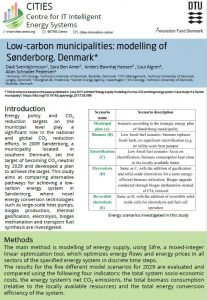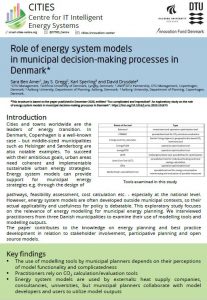Demo case: Energy Supply Modelling in cities: A Case Study of Sønderborg Municipality
The demo project has developed, model and evaluate scenarios for Sønderborg’s energy system in 2029 in order to identify ways of increasing the efficiency and integration of the system while minimizing CO2 emissions and socioeconomic costs.
As a part of this, possibilities for the introduction of new energy conversion technologies in the system, such as heat pumps, biogas production, thermal gasification, electrolysis, biogas methanation and transport fuel synthesis have been investigated.
By using Sifre – a mixed-integer linear optimization model which optimizes the hour-by-hour operation of the defined energy system (developed by Energinet.dk) CITIES has shown
- Scenarios with a high degree of electrification perform better on the selected
indicators than scenarios with a high degree of biomass utilization. - Electrolysis and reversible electrolysis are promising conversion technologies to
be used on a municipal scale. - Achieving the CO2 emission goals in the most energy-efficient, cost-effective and sustainable way requires comparing a wide range of energy system configurations.
- These findings can be transferable to other middle-sized northern European cities limited biomass resources.


